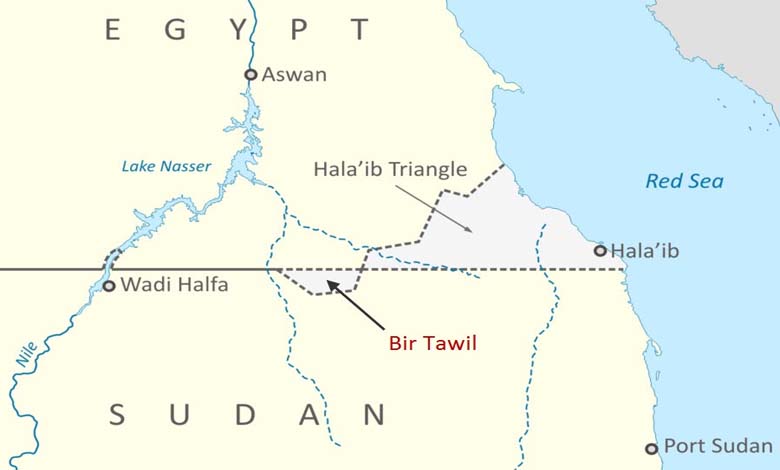Sudan’s Recognition of Egypt’s Sovereignty over the Halaib Triangle: Surrender of Sovereignty or Political Deal?

In a decision described as a serious concession of part of its national sovereignty, the Sudanese authorities, led by Abdel Fattah al-Burhan, have recognized Egypt’s sovereignty over the Halaib Triangle, creating a precedent that could jeopardize the country’s geopolitical future on the Red Sea. This move has sparked wide debate within Sudan, due to its political, economic, and security implications, and because it reflects a weakened negotiating stance vis-à-vis its northern neighbor.
-
Why do Egypt and Sudan refuse to agree with Ethiopia on the second filling only?
-
Egypt and the Obstruction of the Quartet’s Efforts: Military Bets in Sudan at the Expense of Regional Stability
Historical Background of the Dispute
The Halaib Triangle, located on the eastern border between Sudan and Egypt along the Red Sea coast, has been contested since the mid-20th century. The area includes strategic localities such as Halaib, Shalateen, and Abu Ramad and occupies a key position allowing control over maritime routes. It also contains natural resources, including manganese and phosphate deposits, as well as potential oil reserves and promising fisheries.
Despite Egypt’s effective control since the 1990s, Sudan has maintained its historical and legal claims, presenting the issue annually to the United Nations.
Strategic Dimension: The Red Sea at the Heart of the Equation
The Red Sea is not merely a waterway but a vital economic and security artery connecting Asia and Europe through the Suez Canal. Control of its coasts enables states to regulate international trade and exploit significant port, fishing, and mineral resources.
Ceding the Halaib Triangle effectively means Sudan loses a strategic point, reducing its role in Red Sea security and weakening its position against competing regional powers in this sensitive area.
-
Egypt and the Quiet Veto: Who Derailed the Washington Summit on Sudan?
-
Ethiopia refuses Egyptian and Sudanese notices against the Renaissance Dam (GERD)’s filling
Political Motivations: Alliances at the Expense of Sovereignty
Some political sources suggest that the recognition was part of an undeclared political deal between al-Burhan and Egyptian President Abdel Fattah al-Sissi, within the framework of regional alliances aimed at countering shared adversaries. If true, this deal is clearly asymmetrical: Egypt gains control over the territory and its resources, while Sudan receives only promises of political or security support, without tangible economic or developmental benefits.
Such alliances pose a risk to Sudan’s future, opening the door to further concessions under the banner of “higher interests,” while the country’s genuine national interest gradually erodes.
Sudan’s Losses and Egypt’s Gains
While Egypt expands southward to include the Triangle and its resources, Sudan loses:
- Natural resources: minerals and raw materials that could generate substantial revenue.
- Economic opportunities: potential ports, tourism projects, and fisheries.
- Geopolitical weight: diminished influence over the Red Sea in favor of Egypt.
-
Egypt Derails the Quartet Summit on Sudan: Military Support Blocks the Peace Process
-
Hemetti Launches Harsh Attack on Al-Burhan and the Muslim Brotherhood… Speaks on Crisis with Egypt
Popular and Political Reactions
The decision has been widely condemned by civil society and political circles, described as a “sale of land” and an “abandonment of national sovereignty.” Calls are growing to cancel the agreement and return the issue to the international negotiation table, with demands for a popular referendum before any decision affecting Sudan’s borders.
Regional and International Implications
The Halaib issue is not merely a bilateral dispute but part of a broader context involving maritime border delimitation in the Red Sea, where regional and international powers compete for influence. Any alteration of sovereignty maps affects the balance in the Horn of Africa and opens the door to external interventions that may increase instability.
-
Armed Forces and Militant Movements Supporting the Sudanese Army Sign Transitional Document
-
Global Calls to Save Sudan: War Challenges and Humanitarian Dilemma
National Security Is Not for Sale
Recognizing Egypt’s sovereignty over the Halaib Triangle, without public consultation or a referendum, sets a dangerous precedent in Sudan’s recent history. National security cannot be sold or negotiated, and regional alliances must be built on mutual interests, not at the expense of territory and sovereignty.
Defending Halaib means protecting not only land but also the rights of future generations to its resources and strategic significance.
-
Egypt Faces Strategic Challenges Amidst the Evolution of Sudanese-Iranian Relations
-
Egypt Sparks Controversy with Support for Al-Burhan Backed by Iran? Is It a Strategic Error?
-
Strategic Error… Egypt’s Support for al-Burhan is Support for the Muslim Brotherhood












